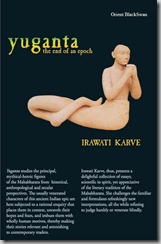Tags
arjun, arjuna, bhishma, book review, draupadi, irawati karve, karn, karna, Krishn, Krishna, Kunti, Mahabharata
She wields the pen like a scimitar and her mind like a microscope.
As she dissects various personas of Mahabharata, she is brutal, incisive and decisive. Passionate (in her arguments) yet dispassionate (towards individuals).
 Her take on Mahabharata is not linear narrative; but deals with individual personas, as she scoffs at the halo around them and simultaneously humanizes and demystifies them.
Her take on Mahabharata is not linear narrative; but deals with individual personas, as she scoffs at the halo around them and simultaneously humanizes and demystifies them.
Many scholars usually steer clear of Krishna, for fear of a religious/fanatic backlash. But not Irawati. She finds him ‘Ambitious’, even a little cold-blooded.’ His ambition was to be Vasudev. But she sums him up aptly in the end as, ‘He did not merely speak the Gita; he lived it.’
She researches and chronicles the multi-level interpolations within the epic’s narration. She adds a commentary on existing social customs, e’g Suta was not an abusive racist slur, but a mere occupation-classifier. Infact, Sauti (who narrated Mahabharata), Sanjaya (who related Kurukshetra to Dhritarashtra) and Vidur (highly consulted counsellor to Dhritarashrta) were all Sutas.
Her perspectives on Bhishma, Gandhari, Kunti (click on the link for my original take on Parthenogenesis – reproduction without sperms in Mahabharata) and Karna are equally original and path-breaking. She even provides pointers towards Vidura being Yudhishtir’s father.
My only grudge is with her judgment on Draupadi. She finds Draupadi’s verbal battle at the dice game improper, thoughtless and smug. Completely disagree on that count. Draupadi won a lopsided battle of violence by resorting to cool logic, a woman who articulated philosophically relevant questions that nobody could answer; back then or even now. Genuflections forever to the Lady.
Beyond that aberration of judgment, Irawati is as precise, unerring and consistent as Arjuna’s arrows.
Languages available: English, Marathi, Hindi


I have this book and find it so interesting that read it many times..
LikeLike
I know, I learn something new every time I re-read it.
LikeLike
Thanks for the wonderful review. Will look for this book. Thanks.
LikeLike
It is a slim little volume, but is quite exhaustive in its research, intuition and conclusions. As it ends, you wish she had gone on and on; yet there is no feeling of incompleteness, if you know what I mean.
LikeLike
I have to look up this book now.
LikeLiked by 1 person
Believe me, you won’t regret it. I have read the original Marathi version, not the translated one. So I hope nothing is lost in translation. I hope the translator has curbed the urge to add his/her 2 bits to the original.
LikeLike
Excellent analysis of the merits and demerits of this famed retelling of the Mahabharata. This book has been on my radar for a while and now I really want to get to it sooner.
LikeLike
It isn’t strictly a re-telling. More of an analytical dissection. But yes, definitely the definite ‘it’ book for Mahabharata fans.
LikeLike
lovely book since your name says shinde I assume you are Maharashtrian there is a book by Tara Vanarase on Shurpanaka I have forgotten its name that’s good too..
LikeLiked by 1 person
Sounds promising. I always thought it was unfair to have her nose cut off for making a frank proposal. Will check it out on Flipkart if available.
If in Marathi, there is a website called BookGanga which caters to marathi books only.
Thanx for the recommendation. I am always on the lookout for new or old good books. Especially the deserving but not-so famous ones.
LikeLike
now I am actually checking you out. Maybe I should introduce you to Nupurroopa Joshi who is great on sourcing these books. 🙂 I have not met her physically we are bloggers of the same sphere, she is the one who recommended this book and vayam rakshasoham. Of course I read marati with a dictionary or my husband handy.
LikeLiked by 1 person
Please send me a link to Nupur’s blog url. The more the merrier.
What is ur mother tongue? Glad you ravish Marathi- It has a rich literary treasure.
LikeLike
🙂 My Mother tongue Kannada, I read, write in Kannada and English. But I am quite familiar with Tamil and Telugu Marati is new to me I read only what Nupur or my mother-in-law recommend. 🙂
LikeLiked by 1 person
I could recommend plenty of Marathi books. What is your fav genre? Mythology, horror, humor, history?
In History we have Shriman Yogi(Shivaji Maharaj), Chaava (Sambhaji), Shahenshah (Aurangzeb), Rau(Bajirao-Mastani), Swami (Madhavrao Peshwa).
In mythology we have Yugandhar (Krishna), Mrityunjay(Karna), Yayati (same name). Horror is primarily governed by Ratnakar Matkari.
Humor is P.L Deshpande, V.P Kale, Acharya Atre.
Cricket/film anecdotes is Shirish Kanekar.
Feminist is Gauri Deshpande.
LikeLike
wow, my forte is mythology, I have directed Mrityunjay, and acted in yayati as sharmishta.
LikeLiked by 1 person
Wow! You are multi-talented. When did you do all this artistic activity? You are a professional or just as a hobby?
LikeLike
Pingback: Pregnant Nun and ‘Parth’enogenesis in Mahabharata | Impractical Dreamer
Pingback: Krishn, the Rorschach test. | Impractical Dreamer